10.20.22 By Sreenivas Vemulapalli

Technology savvy organizations or “modern enterprises” are powered by advanced digital technologies that drive operational excellence and growth. These modern enterprises are highly data-driven, operationalizing big data to capitalize on advanced digitally enabled paradigms and fuel data-driven innovation. So, what are these modern enterprises doing differently that makes them stand out from the crowd?
Modern, data-driven enterprises have the following fundamental attributes that help them solidify their market position and drive global growth.
Intelligent Automation (IA) is at the heart of digital innovation, driving consistency, velocity, and quality at scale. In the context of the modern enterprise, Intelligent Automation looks beyond bottom-line savings to top-line growth and digital transformation, delivering software-powered digital innovation across the enterprise. Intelligent Automation today is all about –
Robotic Process Automation (RPA) and Intelligent Automation (IA) are some of the most misconstrued concepts today. In the simplest definition, RPA involves automating routine, mundane, and repetitive rules-based tasks while IA works on processes that need human judgment, intuition, creativity, and problem-solving skills. By learning to mimic human capabilities, IA takes on a more cognitive approach to routine RPA implementations. A combination of RPA and IA helps modern enterprises streamline both rules-based as well as complex intelligence-driven systems, workflows, and processes to create intelligent, future-ready, self-driven enterprises.
RPA is great to automate simple processes that follow a set of human-defined rules. However, in the case of tasks with many variations or exceptions, like activities around the processing of large volumes of unstructured data, RPA might create scalability challenges that could impact ROI. Humans are adaptable; software bots that are programmed to follow rules aren’t. This is exactly where AI-driven Intelligent Automation supersedes rules-based RPA.
IA integrates core RPA functionalities with additional capabilities where bots learn to adapt in real time. Rapid advancements in AI have created a whole new breed of cognitive technologies capable of mimicking inherent human capabilities such as image identification and handwriting recognition. These cognitive technologies – when integrated with RPA and advanced analytics – enable end-to-end enterprise automation, driving sustained business transformation.
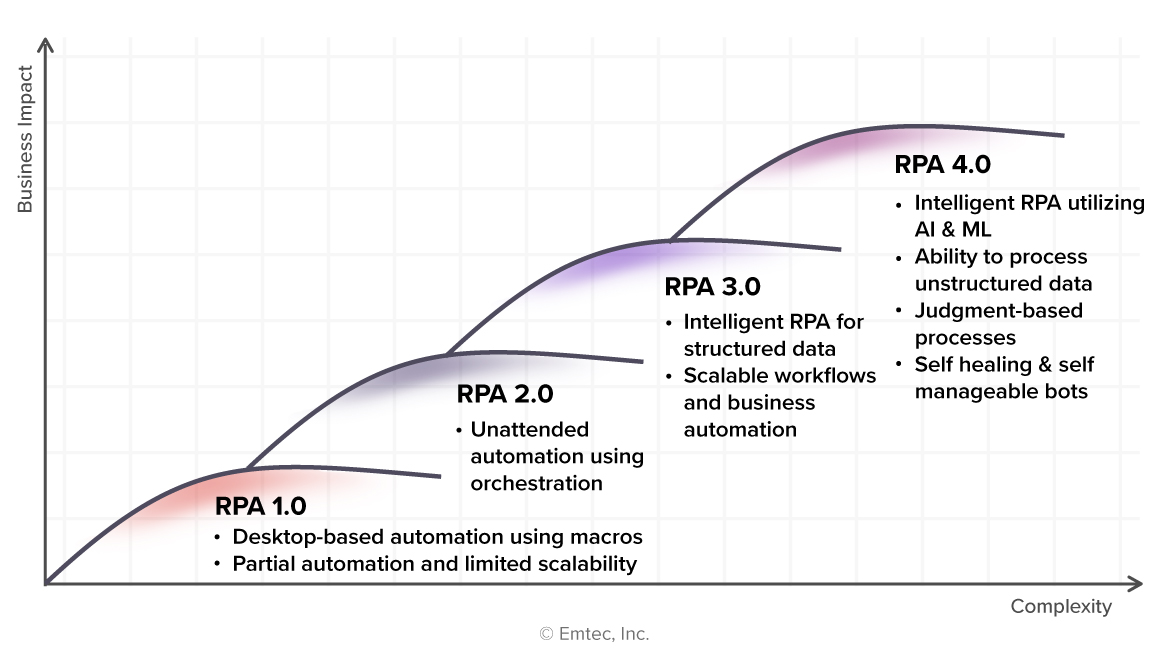
A report published by Everest Group highlights the critical components of Cognitive RPA or RPA 4.01 – the next level of maturity in the conventional enterprise automation model.
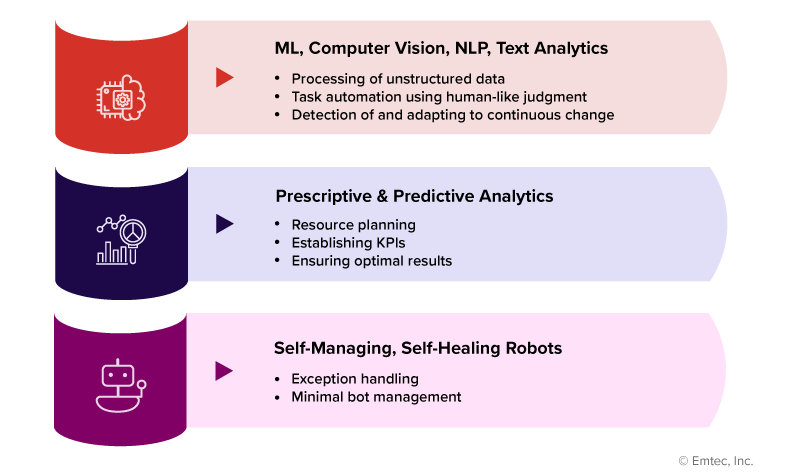
Bridgenext (former Emtec Digital) offers a robust suite of Intelligent Automation services that deliver dynamic process workflows to drive enterprise-wide business transformation. We work closely with clients to measure organizational readiness for IA and build a comprehensive automation roadmap that unlocks maximum value from Intelligent Automation initiatives. Our end-to-end IA solution suite uses factory-based agile development methodologies to deliver high quality, optimized solutions utilizing best-of-breed RPA tools and AI technologies.
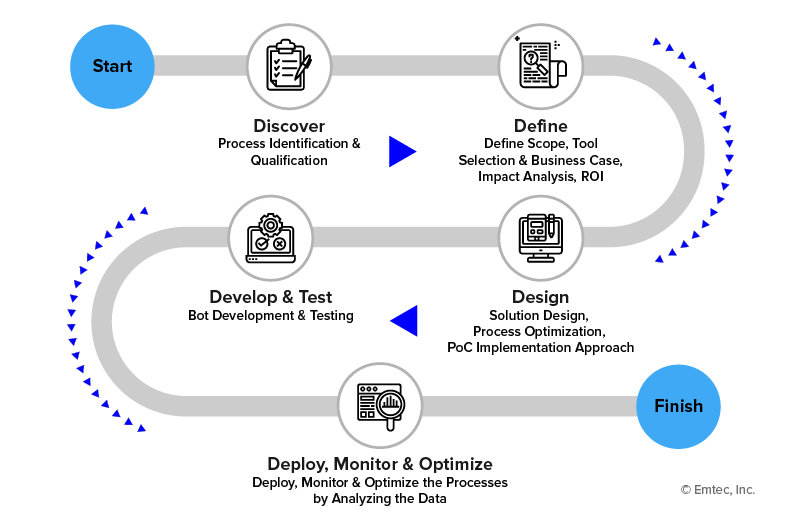
Our Intelligent Automation services enable clients to address critical process and operational challenges in a cost-effective manner, while optimizing and enhancing the performance of the existing automation stack with more control and less risk. Our end-to-end consulting services help enterprises achieve more agility and speed in executing enterprise automation initiatives. Post implementation, our dedicated IA Center of Excellence (CoE) provides extended bot support for efficient process automation. Our value-driven Intelligent Automation deployments are supported by the best automation experts in the industry, advanced tools and accelerators, the latest technology stack, best practices in governance and automation, and industry leading partnerships.
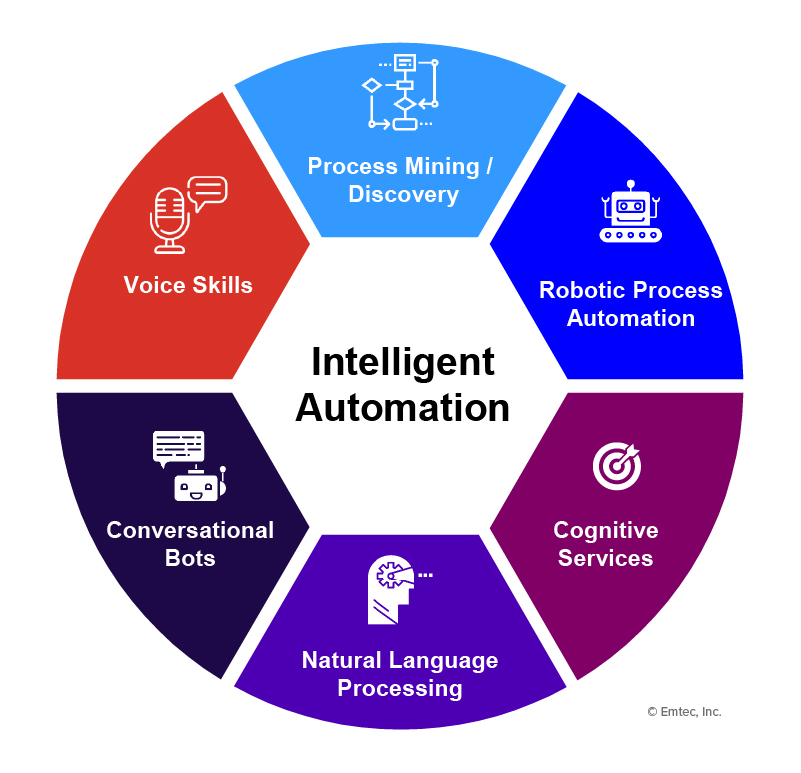
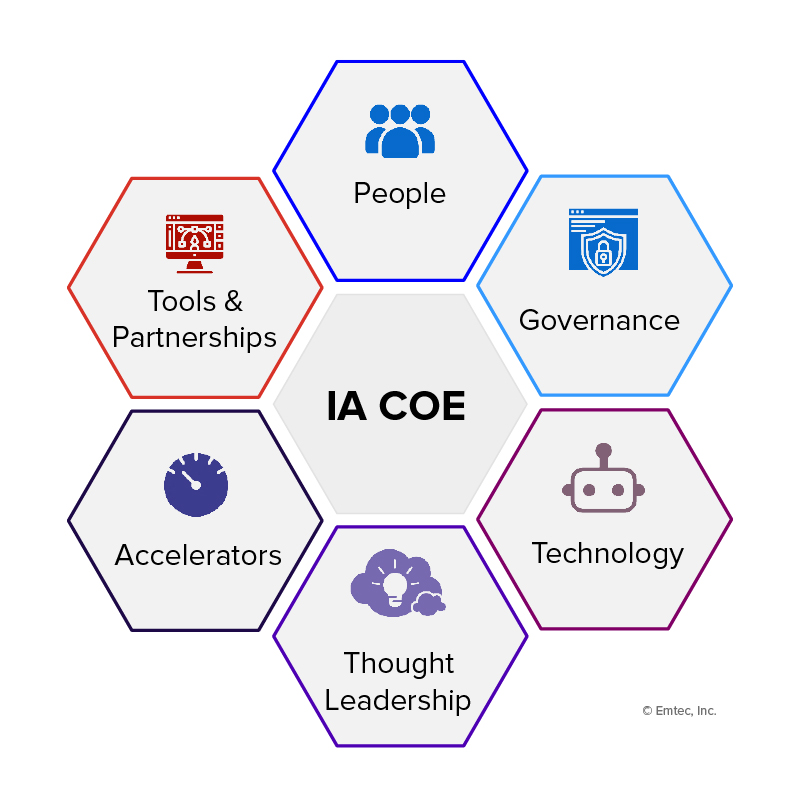
We help clients across a diverse set of industries intelligently automate critical process functions across human capital, finance and accounting, customer service, and IT.
If you are looking to accelerate enterprise automation projects by incorporating advanced Artificial Intelligence and Machine Learning technologies, Bridgenext can help. Our automation experts will study your existing tech stack and identify potential candidates for automation, while suggesting the appropriate technologies that will augment RPA to deliver enhanced efficiencies and facilitate business transformation.
Contact us today for a no-obligation consult to understand how advanced automation technologies can transform your business.
Reference
1 https://www.rpaforum.net/threads/if-you%E2%80%99re-only-automating-with-rpa-you%E2%80%99re-playing-the-short-game.11199/